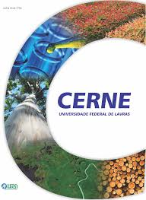
Cerne
Scope & Guideline
Championing Global Discourse on Forest Conservation
Introduction
Aims and Scopes
- Forest Ecology and Management:
Research that explores the dynamics of forest ecosystems, including species interactions, biodiversity, and the effects of management practices on forest health. - Biomass and Bioenergy:
Studies focused on the assessment and optimization of biomass resources for energy production, including the use of various tree species and agricultural residues. - Wood Properties and Utilization:
Investigations into the physical, mechanical, and chemical properties of wood and its derivatives, aiming for improved utilization in various industries. - Climate Change Impact Studies:
Research assessing the effects of climate change on forest ecosystems and species, including adaptation strategies and mitigation measures. - Sustainable Forestry Practices:
Exploration of innovative and sustainable forest management practices that balance ecological integrity with economic viability. - Forest Conservation and Restoration:
Studies aimed at understanding and promoting the conservation of forest ecosystems, including restoration strategies for degraded areas.
Trending and Emerging
- Use of Remote Sensing and Technology:
An increasing number of studies are utilizing remote sensing technologies and machine learning for forest monitoring, biomass estimation, and ecological assessments, indicating a trend towards data-driven research. - Biodegradable Materials and Bio-packaging:
There is a growing focus on the development of biodegradable materials derived from forest resources, particularly cellulose nanocrystals and other wood-based products for sustainable packaging solutions. - Climate Resilience and Adaptation Strategies:
Research addressing climate resilience in forest ecosystems, including adaptation strategies for species and management practices, is becoming increasingly significant as climate change impacts intensify. - Genetic and Molecular Studies:
There is a notable rise in genetic and molecular research aimed at understanding tree species' responses to environmental stresses, contributing to conservation and breeding programs. - Ecosystem Services and Biodiversity Conservation:
Emerging themes related to the assessment of ecosystem services provided by forests and their role in biodiversity conservation are gaining importance, reflecting a holistic view of forest management.
Declining or Waning
- Traditional Silviculture Techniques:
There has been a noticeable decrease in research specifically focused on conventional silvicultural practices, possibly due to a shift towards more innovative and sustainable methods. - Urban Forestry Studies:
The frequency of studies related to urban forestry and its management has diminished, suggesting a potential shift in focus towards rural and natural forest ecosystems. - Non-timber Forest Products (NTFPs):
Research on NTFPs, such as medicinal plants or edible fruits, appears to be less prevalent, possibly overshadowed by more pressing issues related to timber and biomass production. - Forest Economics:
There is a waning interest in traditional forest economics, particularly studies focused solely on market-based approaches, as more holistic and interdisciplinary approaches gain traction.
Similar Journals

Madera y Bosques
Championing Biodiversity and Climate ResilienceMadera y Bosques is a prominent academic journal specializing in the fields of forestry and wood science, published by INST ECOLOGIA A C in Mexico. With an ISSN of 1405-0471 and an E-ISSN of 2448-7597, it has established itself as a vital platform for disseminating research findings, innovative practices, and methodologies pertinent to sustainable forest management and ecological conservation. Operating since 2008, the journal covers a wide scope of topics related to the complexities of forest ecosystems, the importance of biodiversity, and the challenges posed by climate change. Despite its categorization in Q4 for the year 2023 in the Forestry category, Madera y Bosques aims to elevate discourse and practice in the field, providing a voice to emerging researchers and seasoned professionals alike. Additionally, the journal adheres to open access principles, enhancing the visibility and accessibility of its articles to a global audience. Researchers and practitioners are encouraged to engage with its rich content to further their understanding and impact in the world of forestry.

Forest Ecosystems
Connecting research to conservation efforts.Forest Ecosystems is a prestigious open access journal published by KEAI PUBLISHING LTD, dedicated to advancing knowledge in the fields of forestry, ecology, and conservation. Established in 2014 and located in Beijing, China, this journal has rapidly gained prominence, achieving Q1 status in multiple categories, including Ecology, Evolution, Behavior and Systematics, and Forestry in 2023. With an impressive rank of 19 out of 174 in the Scopus category of Agricultural and Biological Sciences - Forestry, it stands in the 89th percentile, reflecting its influential contributions to the field. The journal fosters scholarly discourse and disseminates innovative research aimed at understanding forest ecosystems and their vital role in our environment. Offering a robust platform for researchers, professionals, and students, Forest Ecosystems ensures accessibility through its open access format, enabling a wider audience to engage with and benefit from cutting-edge research dedicated to the stewardship of forest resources.
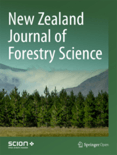
NEW ZEALAND JOURNAL OF FORESTRY SCIENCE
Empowering Knowledge for a Greener TomorrowNEW ZEALAND JOURNAL OF FORESTRY SCIENCE (ISSN: 0048-0134; E-ISSN: 1179-5395), published by SCION, stands as a pivotal resource for researchers, professionals, and students dedicated to the fields of forestry, ecology, and plant sciences. With a strong commitment to open access since 2013, the journal promotes the dissemination of high-quality research and innovative practices within these disciplines, thereby fostering a greater understanding of the natural environment. The journal has achieved commendable rankings, being placed in the Q2 category in Ecology, Forestry, and Plant Science, reflecting its significant contribution to advancing knowledge and best practices in these areas. Based in Switzerland and published by SCION, a trusted name in forest research, the journal plays an integral role in shaping the dialogue around sustainable forest management and ecological conservation. As such, it serves as an essential platform for scholarly discourse and a valuable resource for anyone engaged in forestry and environmental studies.
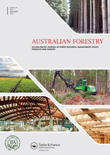
AUSTRALIAN FORESTRY
Innovating Forestry Practices for TomorrowAustralian Forestry is an esteemed journal dedicated to advancing knowledge in the field of forestry and related environmental science. Published by Taylor & Francis Australia, this journal plays a pivotal role in disseminating high-quality research that spans various aspects of forestry, including sustainable management, conservation practices, and policy analysis. With an impact factor reflecting its significance in the academic community and a Scopus rank of #44 out of 174 in the category of Agricultural and Biological Sciences, Australian Forestry proudly holds a Q2 ranking in its field as of 2023. The journal has maintained a continuous publication record since its inception in 1936, with a commitment to addressing contemporary challenges within forestry. Researchers, professionals, and students alike are invited to engage with this vital resource that fosters insightful dialogue, innovative solutions, and a deeper understanding of forestry science.

FORESTRY
Advancing forestry knowledge for a sustainable future.FORESTRY is a prestigious journal dedicated to the advancing knowledge and innovative practices in the field of forestry, published by Oxford University Press. Established in 1927, it encompasses a rich history of scholarly contributions and has evolved to maintain its relevance, addressing contemporary issues and research in forestry and related disciplines. With an impressive Q1 ranking in the category of Forestry, this journal holds a notable position within the Scopus rankings, being placed 20th out of 174 in the Agricultural and Biological Sciences domain, highlighting its significant impact with an 88th percentile standing. Researchers, professionals, and students can access critical insights into forestry management, ecology, and policy, facilitating informed decision-making and fostering sustainable practices. While Open Access options are currently not available, the journal's rigorous peer-review process ensures the publication of high-quality research that contributes both to academic advancement and practical applications in forestry worldwide. The comprehensive coverage from 1927 to 2024 makes FORESTRY an invaluable resource for anyone invested in enhancing the field of forestry.

Journal of Forest Research
Exploring the intricate relationship between society and forests.Welcome to the Journal of Forest Research, a pioneering publication dedicated to advancing the field of forestry and sustainable ecosystem management. Published by Taylor & Francis Ltd and boasting an impressive Q2 ranking within its category, this journal highlights significant research contributions and innovative practices in forest science. With an ISSN of 1341-6979 and E-ISSN of 1610-7403, the journal spans a fruitful history from 1996 and continues to be an influential platform up to 2024. The Scopus rank places it at an esteemed #55 out of 174 in the realm of Agricultural and Biological Sciences, reflecting its high impact within the community. While this journal is not open access, it offers targeted content for researchers, professionals, and students seeking to deepen their understanding of forest ecosystems and promote sustainable practices. Join us in exploring the intricate relationship between society and forests, and contribute to a crucial dialogue on environmental stewardship.

Scientia Forestalis
Exploring the depths of forest ecosystems and their complexities.Scientia Forestalis is a prominent academic journal dedicated to advancing the field of forestry and environmental studies. Established in 1996 and published by the Instituto de Pesquisa e Estudos Florestais (IPEF) in Brazil, this journal provides a critical platform for researchers and practitioners to disseminate innovative studies and findings in forestry. With an HIndex reflective of its academic impact and ranking in the third quartile of forestry journals, Scientia Forestalis is positioned to cater to a diverse audience, including scholars, professionals, and students engaged in agricultural and biological sciences. Despite its non-open access model, the journal maintains a commitment to high-quality research that fosters an understanding of forest ecosystems and sustainable practices. Published articles span a wide range of topics, ensuring that crucial developments in forestry science are captured and shared. The journal's current Scopus rank places it within the 26th percentile, affirming its role in shaping forestry research in a global context, making it an essential resource for anyone interested in this vital field.
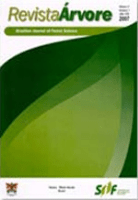
REVISTA ARVORE
Empowering Research for a Greener TomorrowREVISTA ARVORE is a distinguished, peer-reviewed journal in the field of Forestry, published by Universidade Federal de Viçosa in Brazil. Renowned for its commitment to open access since 2002, this journal facilitates the dissemination of innovative research and knowledge to a global audience, encompassing topics from sustainable forest management to ecological conservation. With an impact factor reflective of its engagement in the community and a current Scopus ranking that places it in the 28th percentile among journals in Agricultural and Biological Sciences, it provides a vital platform for both emerging and established scholars. The journal is indexed under ISSN 0100-6762 and E-ISSN 1806-9088, making it accessible to a wide readership. As it converges its publication years from 2006 to 2024, REVISTA ARVORE aims to contribute significantly to the advancement of forestry science and practices, thereby encouraging environmental sustainability and innovation within the field.
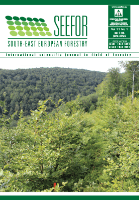
SEEFOR-South-East European Forestry
Fostering collaboration for sustainable forest development.SEEFOR-South-East European Forestry is a premier open-access journal dedicated to advancing knowledge in the field of forestry and environmental science. Published by the CROATIAN FOREST RESEARCH INSTITUTE, this journal has been operational since 2010, providing a platform for research that focuses on the unique forestry dynamics of the South-East European region. With an ISSN of 1847-6481 and an E-ISSN of 1849-0891, SEEFOR is recognized for its commitment to disseminating high-quality research that addresses critical issues in forestry management, conservation, and sustainable development. The journal is indexed in Scopus, placing it within the third quartile (Q3) of forestry journals, reflecting its significance within the academic community. SEEFOR aims to connect researchers, practitioners, and policymakers, fostering collaboration and innovation in fostering sustainable forestry practices in Croatia and beyond. Submissions are welcome in a range of areas including forest ecology, policy development, and socio-economic impacts, making it an invaluable resource for professionals and students alike.
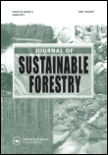
Journal of Sustainable Forestry
Pioneering insights in sustainable forestry and environmental stewardship.Journal of Sustainable Forestry is a premier academic publication dedicated to advancing knowledge and practices in the field of sustainable forestry and environmental management. Published by Taylor & Francis Inc in the United Kingdom, this journal has been a cornerstone for researchers and professionals since its inception in 1992. With an impressive reputation, it boasts a 2023 Q2 ranking in Food Science, Forestry, and Geography, Planning and Development, highlighting its significant contribution to interrelated disciplines. The journal’s impact is further underscored by its Scopus ranking, especially in Forestry where it holds the 43rd position out of 174 publications, placing it in the 75th percentile. Although not open access, the journal remains committed to providing innovative research and practical insights into forest management, ecological sustainability, and policy development. As the field of sustainable forestry continues to evolve, the Journal of Sustainable Forestry serves as an essential resource for those committed to advancing sustainable practices globally, fostering a deeper understanding of how sustainable forestry can contribute to environmental resilience and biodiversity conservation.